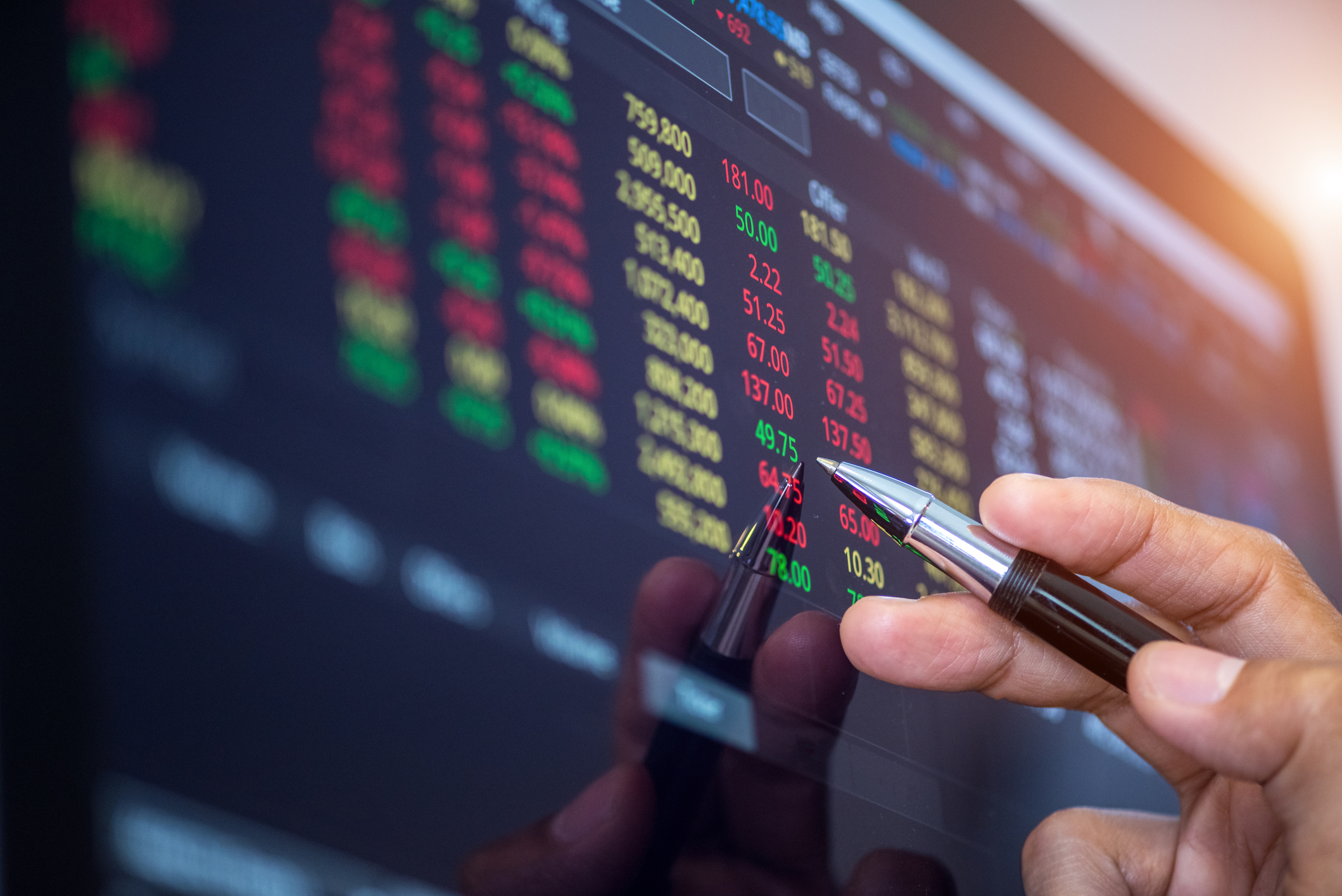The Best Mid-Cap Stocks to Buy
The best mid-cap stocks offer up an ideal combination of stability and growth potential.


Profit and prosper with the best of Kiplinger's advice on investing, taxes, retirement, personal finance and much more. Delivered daily. Enter your email in the box and click Sign Me Up.
You are now subscribed
Your newsletter sign-up was successful
Want to add more newsletters?

Delivered daily
Kiplinger Today
Profit and prosper with the best of Kiplinger's advice on investing, taxes, retirement, personal finance and much more delivered daily. Smart money moves start here.

Sent five days a week
Kiplinger A Step Ahead
Get practical help to make better financial decisions in your everyday life, from spending to savings on top deals.

Delivered daily
Kiplinger Closing Bell
Get today's biggest financial and investing headlines delivered to your inbox every day the U.S. stock market is open.

Sent twice a week
Kiplinger Adviser Intel
Financial pros across the country share best practices and fresh tactics to preserve and grow your wealth.

Delivered weekly
Kiplinger Tax Tips
Trim your federal and state tax bills with practical tax-planning and tax-cutting strategies.

Sent twice a week
Kiplinger Retirement Tips
Your twice-a-week guide to planning and enjoying a financially secure and richly rewarding retirement

Sent bimonthly.
Kiplinger Adviser Angle
Insights for advisers, wealth managers and other financial professionals.

Sent twice a week
Kiplinger Investing Weekly
Your twice-a-week roundup of promising stocks, funds, companies and industries you should consider, ones you should avoid, and why.

Sent weekly for six weeks
Kiplinger Invest for Retirement
Your step-by-step six-part series on how to invest for retirement, from devising a successful strategy to exactly which investments to choose.
If you read investing articles or watch CNBC, you'll find that coverage is largely skewed in favor of both ends of the market-cap spectrum.
Financial media outlets will write a story a day on the likes of mega-cap giants such Nvidia (NVDA) or Apple (AAPL). But given their propensity for massive single-day moves, small-cap companies will often draw some spotlight, too.
Today, however, we're going to give the market's "middle child" its due.
Read on as we discuss mid caps — specifically, what they are, why you'd want to invest in them, and how to find the best mid-cap stocks to buy.

What are mid-cap stocks?
The investing community has a funny way of agreeing on terminology in the abstract, but failing to come together when it's time to discuss specifics.
Broadly speaking, mid-cap stocks are those companies that aren't quite as big as large-cap stocks, but are bigger than small-cap stocks, pretty much what you'd expect.
What exactly does that look like?
The market cap ranges vary depending on who's talking about them. If you look around, you'll see suggestions of $5 billion to $20 billion, $10 billion to $20 billion … heck, American Century says they're $11 billion to $65 billion.
The Russell MidCap Index doesn't even assign a specific dollar value. Instead, it views the mid-cap world (at least in the U.S.) as stocks that rank 201 through 1,000 by market cap, whatever those market caps might be.
However, as with many financial outlets, we've long held that mid-cap stocks are companies with market capitalizations that go from $2 billion to $10 billion. A little later, when we show you how to search for mid-caps, that's the range with which we're working.
Whatever numbers you prefer, when you're dealing with mid-cap stocks, they're the middle" of the market-cap world, which is why they're often referred to as "Goldilocks stocks."
Why Goldilocks? We'll assume everyone is familiar with the story of Goldilocks and The Three Bears. The moral of the story is that you'll usually find happiness in between two extremes.
I don't think that applies to every aspect of life, but the lesson rings true with mid-cap stocks, which, from a performance perspective, are "just right."
Historically speaking, anyway.
Company (ticker) | Market cap | Long-term EPS growth rate | Estimated annual revenue growth (2 years) | Analysts' consensus recommendation |
Clear Secure (YOU) | $3.0 billion | 132.0% | 13.1% | 2.44 |
Range Resources (RRC) | $8.2 billion | 150.0 | 18.6 | 2.42 |
Synovus Financial (SNV) | $6.1 billion | 65.3 | 12.3 | 2.13 |
Sonoco Products (SON) | $3.9 billion | 92.4 | 19.7 | 2.00 |
Ollie's Bargain Outlet Holdings (OLLI) | $7.4 billion | 11.8 | 14.6 | 1.87 |
Antero Resources (AR) | $9.3 billion | 61.8 | 13.1 | 1.82 |
Advanced Energy Industries (AEIS) | $7.8 billion | 234.3 | 12.2 | 1.82 |
UMB Financial (UMBF) | $8.2 billion | 56.4 | 30.0 | 1.77 |
Veracyte (VCYT) | $2.8 billion | 30.8 | 11.1 | 1.75 |
Agree Realty (ADC) | $8.4 billion | 20.1 | 15.8 | 1.71 |
Penumbra (PEN) | $9.0 billion | 9.3 | 14.2 | 1.60 |
Boot Barn Holdings (BOOT) | $5.7 billion | 462.0 | 14.5 | 1.53 |
Planet Fitness (PLNT) | $7.6 billion | 9.0 | 10.1 | 1.44 |
Essential Properties Realty Trust (EPRT) | $5.9 billion | 7.7 | 20.2 | 1.35 |
BrightSpring Health Services (BTSG) | $5.9 billion | 1,197.7 | 12.8 | 1.31 |
Dycom Industries (DY) | $8.3 billion | 25.0 | 11.0 | 1.11 |

Why do people buy mid-cap stocks?
The logic goes something like this:
Mid-cap stocks tend to exhibit an ideal mix of characteristics of both their larger and smaller brethren.
On the one hand, they're more stable, better-capitalized, more profitable and have wider revenue streams than small caps.
On the other, they still have more room for growth, are nimbler and often aren't as overcrowded as big ol' blue chip stocks.
It doesn't just sound good in theory. The long-term data, studied by a variety of asset managers over the years, show that midsize companies are the real deal.
Consider this 2025 Invesco paper on mid-cap leadership:
"With an 11.0% annualized return, mid caps have outperformed small caps (9.05% annualized return) and large caps (10.4% annualized return) since the inception of the Russell Midcap Index in 1991 [through the end of 2024]. And they've done this often. Mid-caps outperformed large caps 56% of the time and small caps 92% of the time for monthly five-year rolling periods."
More recent history hasn't been nearly so favorable.
In the past 10 to 15 years, several factors — including growing economic advantages for large companies, periods of rocky markets driving investors' preference toward more stable holdings, and investors plunking lopsided sums into large-cap stock funds — have turned larger companies into the market's darlings.
That's resulted in a straight-up whupping of their middle- and small-sized counterparts. In the past 10 years, the S&P 500 has generated a total return of 293% through October 30. This compares with a 164% total return for the S&P 400 and a 144% gain for the S&P 600.
But the tide might be starting to turn. Lagging performance has translated into historically low relative valuations for the mid-cap space.
Earlier this year, numerous asset managers noted the growing cheapness in midsized companies. Consider this from a February paper by Artisan Partners' U.S. value team (PDF):
"The case for allocating to mid-cap stocks is made even more compelling by relative valuations. Mid-cap stocks haven't been this cheap on a relative basis since coming out of the tech bubble in the early 2000s. Typically, mid-cap stocks trade at a slight premium to large-cap stocks due to their faster growth rates, however today they sell at a discount of 4.6 multiple points.
… While valuations may not be of much use as a timing tool, the last time the valuation discount was this large back in the early 2000s, a multiple-year period of mid-cap stock outperformance ensued."
Little has changed since, meaning investors who want to jump into the mid-cap space can still do so for a historically relative song.

How to find the best mid-cap stocks to buy
Naturally, you can get exposure to mid-cap stocks through mutual funds and exchange-traded funds (ETFs), which will hold hundreds, even thousands of them at a time.
But a word of warning: Mid-caps are in a different position than many large=caps in the growth cycle, so you don't always get the same characteristics out of a sector's large-cap stocks as you get out of their mid-caps.
Mid-cap consumer staples stocks can be surprisingly spritely, as can other typically defensive plays such as utilities.
While some investors might look to mid-cap stocks to provide at least a little income, we're going to help you start your search with a basic quality screen that largely focuses on mid-caps' growth potential.
To get to the following list of the best mid-cap stocks to buy, we've looked for firms within the sector that …
Are within the S&P 1500. The S&P 1500 is made up of the S&P 500 (large caps), S&P MidCap 400 (mid caps) and S&P SmallCap 600 (small caps). However, while we normally use the S&P 1500 to get a universe of stocks of all caps, we're solely using this starting point to focus on predominantly U.S. companies.
Have a market cap from $2 billion to $10 billion. Without getting too far into the weeds, it's possible that all three indexes contain companies that are mid-caps based on these market capitalizations. We're combining the S&P 1500 criterion with market cap to get a list of qualifying mid caps.
Are expected to grow earnings by at least 7% annually over the long term. We're looking for at least a reasonable level of long-term earnings growth.
Are expected to grow revenue by at least 10% annually in the next two years. This helps us look for companies that aren't just going to achieve higher earnings with cost savings — we want companies that are expected to grow.
Have at least eight covering analysts. We'd like to look at stocks that are on Wall Street analysts' radar, which makes it likelier that there's both more reporting and more insights on these companies. The more research we have at our disposal, the more educated a decision we can make.
Have a consensus Buy rating. All the stocks must have an average broker recommendation of 2.5 or less within S&P Global Market Intelligence's ratings scale — meaning they are some of the analysts' favorite stocks.
S&P Global Market Intelligence converts analysts' ratings into a numerical scale. Anything with a score of 2.5 or less is considered a Buy. Every stock that made the list has a score of 2.5 or less, though most of them have much lower scores than that, meaning they're higher-conviction consensus Buys.
Related content
Profit and prosper with the best of Kiplinger's advice on investing, taxes, retirement, personal finance and much more. Delivered daily. Enter your email in the box and click Sign Me Up.
Kyle Woodley is the Editor-in-Chief of WealthUp, a site dedicated to improving the personal finances and financial literacy of people of all ages. He also writes the weekly The Weekend Tea newsletter, which covers both news and analysis about spending, saving, investing, the economy and more.
Kyle was previously the Senior Investing Editor for Kiplinger.com, and the Managing Editor for InvestorPlace.com before that. His work has appeared in several outlets, including Yahoo! Finance, MSN Money, Barchart, The Globe & Mail and the Nasdaq. He also has appeared as a guest on Fox Business Network and Money Radio, among other shows and podcasts, and he has been quoted in several outlets, including MarketWatch, Vice and Univision. He is a proud graduate of The Ohio State University, where he earned a BA in journalism.
You can check out his thoughts on the markets (and more) at @KyleWoodley.
-
 5 Vince Lombardi Quotes Retirees Should Live By
5 Vince Lombardi Quotes Retirees Should Live ByThe iconic football coach's philosophy can help retirees win at the game of life.
-
 The $200,000 Olympic 'Pension' is a Retirement Game-Changer for Team USA
The $200,000 Olympic 'Pension' is a Retirement Game-Changer for Team USAThe donation by financier Ross Stevens is meant to be a "retirement program" for Team USA Olympic and Paralympic athletes.
-
 10 Cheapest Places to Live in Colorado
10 Cheapest Places to Live in ColoradoProperty Tax Looking for a cozy cabin near the slopes? These Colorado counties combine reasonable house prices with the state's lowest property tax bills.
-
 Don't Bury Your Kids in Taxes: How to Position Your Investments to Help Create More Wealth for Them
Don't Bury Your Kids in Taxes: How to Position Your Investments to Help Create More Wealth for ThemTo minimize your heirs' tax burden, focus on aligning your investment account types and assets with your estate plan, and pay attention to the impact of RMDs.
-
 Are You 'Too Old' to Benefit From an Annuity?
Are You 'Too Old' to Benefit From an Annuity?Probably not, even if you're in your 70s or 80s, but it depends on your circumstances and the kind of annuity you're considering.
-
 In Your 50s and Seeing Retirement in the Distance? What You Do Now Can Make a Significant Impact
In Your 50s and Seeing Retirement in the Distance? What You Do Now Can Make a Significant ImpactThis is the perfect time to assess whether your retirement planning is on track and determine what steps you need to take if it's not.
-
 Your Retirement Isn't Set in Stone, But It Can Be a Work of Art
Your Retirement Isn't Set in Stone, But It Can Be a Work of ArtSetting and forgetting your retirement plan will make it hard to cope with life's challenges. Instead, consider redrawing and refining your plan as you go.
-
 The Bear Market Protocol: 3 Strategies to Consider in a Down Market
The Bear Market Protocol: 3 Strategies to Consider in a Down MarketThe Bear Market Protocol: 3 Strategies for a Down Market From buying the dip to strategic Roth conversions, there are several ways to use a bear market to your advantage — once you get over the fear factor.
-
 Dow Adds 1,206 Points to Top 50,000: Stock Market Today
Dow Adds 1,206 Points to Top 50,000: Stock Market TodayThe S&P 500 and Nasdaq also had strong finishes to a volatile week, with beaten-down tech stocks outperforming.
-
 The Best Precious Metals ETFs to Buy in 2026
The Best Precious Metals ETFs to Buy in 2026Precious metals ETFs provide a hedge against monetary debasement and exposure to industrial-related tailwinds from emerging markets.
-
 For the 2% Club, the Guardrails Approach and the 4% Rule Do Not Work: Here's What Works Instead
For the 2% Club, the Guardrails Approach and the 4% Rule Do Not Work: Here's What Works InsteadFor retirees with a pension, traditional withdrawal rules could be too restrictive. You need a tailored income plan that is much more flexible and realistic.

